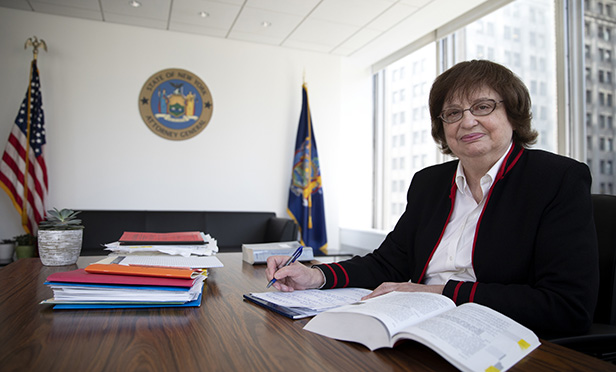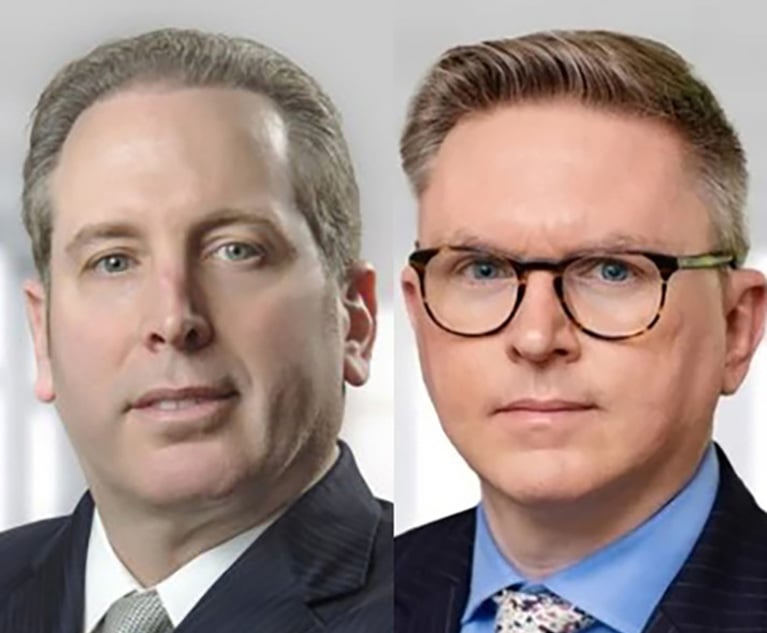State AGs Emerging as 'Most Feared Regulators,' Attorney Says
State attorneys general have expanded their roles in recent years to fill an enforcement void left by some federal agencies, and they are often joining together to form a multistate juggernaut of litigation, according to Daniel Suvor, counsel in the Los Angeles office of O'Melveny & Myers.
December 05, 2018 at 08:06 AM
5 minute read
The original version of this story was published on Corporate Counsel
 Interim Attorney General Barbara Underwood. Photo: Attorney General's Office.
Interim Attorney General Barbara Underwood. Photo: Attorney General's Office.
There's a new corporate sheriff in town, with a different name: state attorney general. Well, maybe not so much new, as increasingly fearsome for general counsel.
State attorneys general have expanded their roles in recent years to fill an enforcement void left by some federal agencies, and they are often joining together to form a multistate juggernaut of litigation, according to Daniel Suvor, counsel in the Los Angeles office of O'Melveny & Myers.
Suvor said that he's been warning his clients about “big changes happening at the state level, with the emergence of state attorneys general as the most feared regulators that big business has.”
In the most recent example, New York Attorney General Barbara Underwood on Tuesday announced a nearly $5 million settlement with Oath Inc. (a Verizon Communications Inc. subsidiary formerly known as AOL Inc.) for violating the federal Children's Online Privacy Protection Act. It was the largest-ever penalty in a COPPA case in the United States. COPPA is usually enforced by the Federal Trade Commission.
And there's more state action to come, Suvor said: Democrats picked up AG seats in four key battleground states in the recent midterm elections, and now hold a 27-24 majority of the nation's AG offices, he noted.
“Each one of the new attorneys general is intent on increasing enforcement over big companies,” Suvor said. “I think in part that trend was set in motion through the national tobacco settlement and the national mortgage settlement, bolstered by a lack of enforcement by the FTC, the CFPB [U.S. Consumer Financial Protection Bureau], the FDA [U.S. Food and Drug Administration] and other agencies. AGs are intent on filling that void.”
He said AGs appear especially active on matters involving the environment, health care, privacy, data security, deceptive practices and other consumer issues, financial services, and the food and drug space.
New York, California and Massachusetts have “some of the most aggressive laws to give state attorneys general the most power, especially in consumer protection,” Suvor said.
“Companies need to get smarter about ensuring they are compliant with state laws,” he said. And, Suvor added, they need to build stronger relationships with state AGs through direct meetings, trade groups or the National Association of Attorneys General.
Both the Republicans and Democrats have their own AG associations, RAGA, the Republican Attorneys General Association, and DAGA, the Democratic Attorneys General Association.
In a recent newsletter, Suvor and his law firm colleagues wrote that with more Democratic attorneys general elected to office, there will certainly be an increase in enforcement activity in those states. For example:
• Newly elected AG Dana Nessel vowed to seek an end to sexual harassment in the workplace and to aggressively sue companies that contributed to chemical contamination of Michigan's drinking water.
• In Wisconsin, newly elected AG Josh Kaul said he would seek new firearms regulations, including universal background checks in his state.
• And in Nevada, Aaron Ford promised to better protect the environment through more enforcement of regulations there.
The newsletter also said the midterm elections marked historic spending on state attorney general campaigns—with over $100 million spent in 2018, at least two times more than has ever been spent on previous AG elections.
Midterm contribution records from Political MoneyLine show corporations gave big to both parties in the AG races. For instance, DAGA's top contributors were unions such as the International Brotherhood of Electrical Workers ($350,000), its top donor. But Altria Group Inc. ($200,000), the law firm of Bernstein Litowitz Berger & Grossmann ($155,000), Anthem Inc. ($150,000), Home Depot Inc. ($150,000), Reynolds American Inc. ($150,000) and Germany's Deutsche Telekom ($130,150) were also among its top 20 donors.
Similar figures for RAGA showed Altria ($440,000) and Anthem ($285,000) covering their bets. The largest RAGA contributors included the Judicial Crisis Network, a conservative judicial think tank ($1.59 million); Citizens for a Working America Inc. ($930,000); and the National Rifle Association ($835,000).
Among companies, the largest RAGA contributors were Noble Energy Inc. ($520,000); Koch Industries ($515,000); and Anadarko Petroleum Corp. ($500,000).
Bruce Freed, president and co-founder of the Center for Political Accountability, told Corporate Counsel that companies need to be careful making political donations “in this hyper-polarized environment. It's like nitroglycerin, when you shake the bottle you never know when it might explode.”
Freed referred to his group's report released earlier this year, “Collision Course: The Risks Companies Face When Their Political Spending and Core Values Conflict and How to Address Them.”
“If companies do spend on campaigns,” he said, “they need to do so much more carefully and with strict policies in place, rigorous board oversight and full transparency.”
Read more:
AOL Agrees to Pay Largest Ever Settlement Under Children's Privacy Law
NY AG Announces Probe of Marriott Data Breach and Its Failure to Report Incident
Exxon Mobil Appeals Dismissal of Bid to Derail State AGs' Climate Change Actions
Trump Presidency Could Shift Regulatory Spotlight to State and AG
This content has been archived. It is available through our partners, LexisNexis® and Bloomberg Law.
To view this content, please continue to their sites.
Not a Lexis Subscriber?
Subscribe Now
Not a Bloomberg Law Subscriber?
Subscribe Now
NOT FOR REPRINT
© 2025 ALM Global, LLC, All Rights Reserved. Request academic re-use from www.copyright.com. All other uses, submit a request to [email protected]. For more information visit Asset & Logo Licensing.
You Might Like
View All


Law Firms Expand Scope of Immigration Expertise Amid Blitz of Trump Orders
6 minute readTrending Stories
- 128 Firms Supporting Retired Barnes & Thornburg Litigator in Georgia Supreme Court Malpractice Case
- 2Boosting Litigation and Employee Benefits Practices, Two Am Law 100 Firms Grow in Pittsburgh
- 3EMT Qualifies as 'Health Care Provider' Under Whistleblower Act, State Appellate Court Rules
- 4Bar Report - Feb. 3
- 5Was $1.3M in 'Incentive' Payments Commission? NJ Justices Weigh Arguments
Who Got The Work
J. Brugh Lower of Gibbons has entered an appearance for industrial equipment supplier Devco Corporation in a pending trademark infringement lawsuit. The suit, accusing the defendant of selling knock-off Graco products, was filed Dec. 18 in New Jersey District Court by Rivkin Radler on behalf of Graco Inc. and Graco Minnesota. The case, assigned to U.S. District Judge Zahid N. Quraishi, is 3:24-cv-11294, Graco Inc. et al v. Devco Corporation.
Who Got The Work
Rebecca Maller-Stein and Kent A. Yalowitz of Arnold & Porter Kaye Scholer have entered their appearances for Hanaco Venture Capital and its executives, Lior Prosor and David Frankel, in a pending securities lawsuit. The action, filed on Dec. 24 in New York Southern District Court by Zell, Aron & Co. on behalf of Goldeneye Advisors, accuses the defendants of negligently and fraudulently managing the plaintiff's $1 million investment. The case, assigned to U.S. District Judge Vernon S. Broderick, is 1:24-cv-09918, Goldeneye Advisors, LLC v. Hanaco Venture Capital, Ltd. et al.
Who Got The Work
Attorneys from A&O Shearman has stepped in as defense counsel for Toronto-Dominion Bank and other defendants in a pending securities class action. The suit, filed Dec. 11 in New York Southern District Court by Bleichmar Fonti & Auld, accuses the defendants of concealing the bank's 'pervasive' deficiencies in regards to its compliance with the Bank Secrecy Act and the quality of its anti-money laundering controls. The case, assigned to U.S. District Judge Arun Subramanian, is 1:24-cv-09445, Gonzalez v. The Toronto-Dominion Bank et al.
Who Got The Work
Crown Castle International, a Pennsylvania company providing shared communications infrastructure, has turned to Luke D. Wolf of Gordon Rees Scully Mansukhani to fend off a pending breach-of-contract lawsuit. The court action, filed Nov. 25 in Michigan Eastern District Court by Hooper Hathaway PC on behalf of The Town Residences LLC, accuses Crown Castle of failing to transfer approximately $30,000 in utility payments from T-Mobile in breach of a roof-top lease and assignment agreement. The case, assigned to U.S. District Judge Susan K. Declercq, is 2:24-cv-13131, The Town Residences LLC v. T-Mobile US, Inc. et al.
Who Got The Work
Wilfred P. Coronato and Daniel M. Schwartz of McCarter & English have stepped in as defense counsel to Electrolux Home Products Inc. in a pending product liability lawsuit. The court action, filed Nov. 26 in New York Eastern District Court by Poulos Lopiccolo PC and Nagel Rice LLP on behalf of David Stern, alleges that the defendant's refrigerators’ drawers and shelving repeatedly break and fall apart within months after purchase. The case, assigned to U.S. District Judge Joan M. Azrack, is 2:24-cv-08204, Stern v. Electrolux Home Products, Inc.
Featured Firms
Law Offices of Gary Martin Hays & Associates, P.C.
(470) 294-1674
Law Offices of Mark E. Salomone
(857) 444-6468
Smith & Hassler
(713) 739-1250







